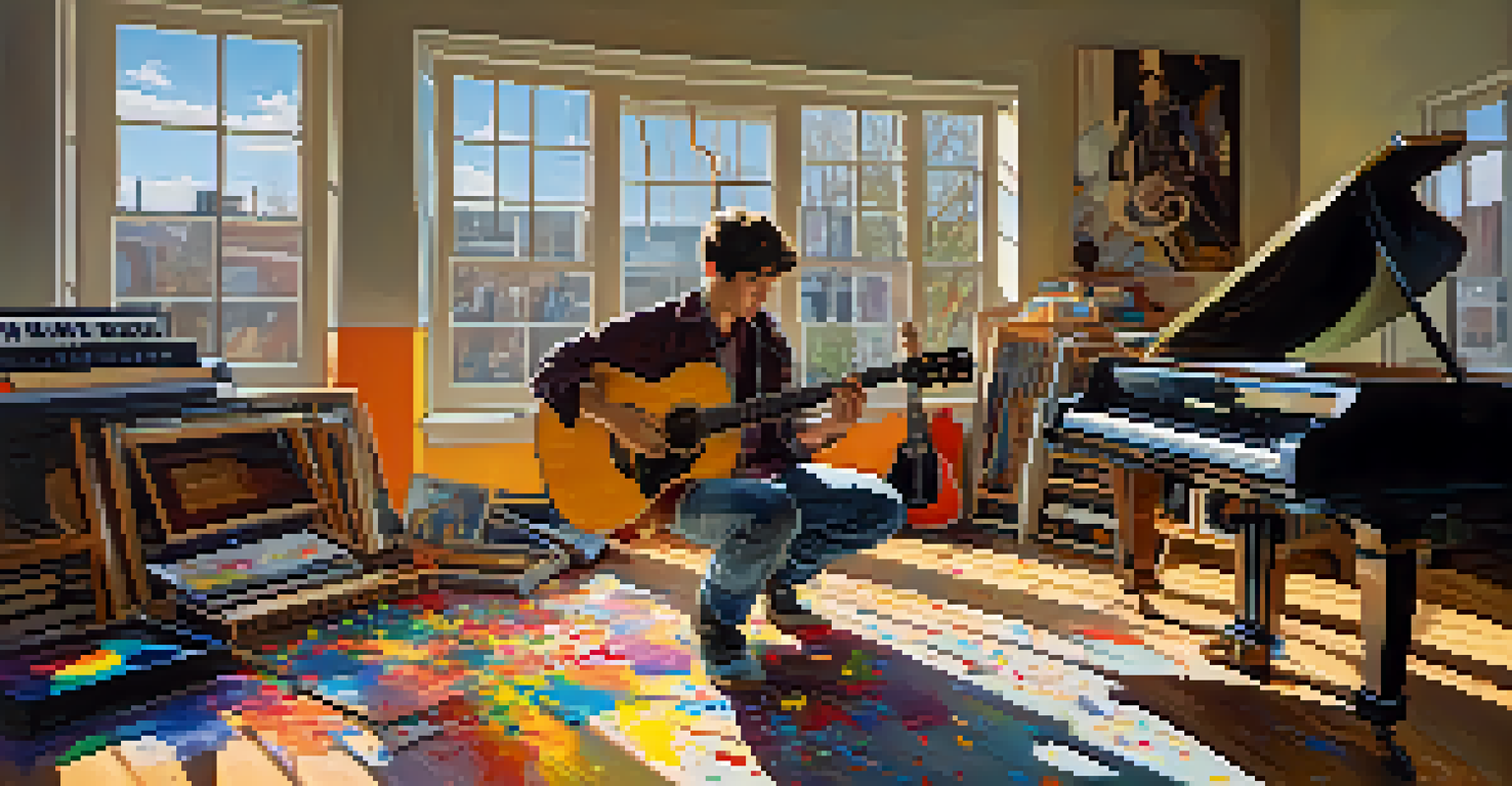Writing Lyrics that Reflect Personal Stories Through Guitar

Understanding the Power of Personal Storytelling in Lyrics
Songwriting is a deeply personal endeavor, and tapping into your own experiences can create powerful connections with listeners. When you write lyrics that reflect your own story, you’re not just sharing thoughts; you’re inviting others into your world. This authenticity resonates, making your songs relatable and memorable.
The best songs come from the heart, where your personal experiences reside.
Think of your life as a tapestry of experiences, each thread representing a moment or emotion. By weaving these threads into your lyrics, you can craft a narrative that speaks to universal themes such as love, loss, or triumph. It's this blend of personal and universal that can engage an audience on a profound level.
Every artist has a story, and your unique perspective is your strongest asset. Embrace it! Whether you’re recalling a childhood memory or a recent challenge, your personal journey can be the foundation for compelling lyrics that captivate your listeners.
Choosing the Right Guitar Chords to Match Your Mood
The guitar is a versatile instrument that can help convey the emotion behind your lyrics. Different chords evoke different feelings—major chords often sound bright and happy, while minor chords can bring a more somber or introspective tone. Understanding this relationship between chords and emotions is crucial for enhancing your lyrical storytelling.

For instance, if you’re writing about heartbreak, a progression featuring minor chords can amplify that sense of loss. Conversely, if your lyrics celebrate a joyous moment, major chords can uplift the melody and reflect that happiness. Experimenting with different progressions will help you find the perfect match for your story.
Personal Storytelling Resonates
Writing lyrics that reflect your own experiences creates authentic connections with listeners.
Think of the guitar as your emotional palette. Just as a painter chooses colors to convey a mood, you can select chords that harmonize with your lyrical themes. This combination of lyrics and music creates a richer, more immersive experience for your audience.
Finding Inspiration in Everyday Life Experiences
Inspiration for songwriting often lies in the mundane details of everyday life. Whether it’s a conversation overheard at a café or a walk through your neighborhood, these moments can spark ideas for your lyrics. By being observant and open to your surroundings, you can uncover stories waiting to be told.
Songwriting is about finding the truth in your experiences and expressing it in a way that others can connect to.
Consider keeping a journal to jot down thoughts, feelings, and observations that resonate with you. This practice can help you capture fleeting moments of inspiration that might otherwise be forgotten. Later, these notes can serve as a springboard for your lyrics.
Remember, every person has a story worth telling. By drawing from your daily experiences, you’ll find a wealth of material that can translate into powerful lyrics. This connection to the ordinary can make your songwriting feel genuine and grounded.
Crafting Your Lyrics: Start with a Theme or Emotion
When you sit down to write, it helps to have a clear theme or emotion in mind. This focus gives your lyrics direction and purpose. Whether it’s a feeling of nostalgia or a moment of joy, identifying this central idea can guide your writing process and keep your thoughts organized.
Once you have your theme, brainstorm words and phrases associated with it. This can help you build a lyrical vocabulary that aligns with your chosen emotion. Don't be afraid to experiment with metaphors or vivid imagery to bring your theme to life.
Chords Convey Emotional Depth
Selecting the right guitar chords can enhance the emotional impact of your lyrics and storytelling.
Think of your theme as the backbone of your song. All the verses, choruses, and melodies will revolve around this central idea, creating a cohesive story. This clarity will help listeners connect with your message and feel the emotions you’re trying to convey.
Using Imagery and Metaphor to Enhance Your Lyrics
Imagery and metaphor are powerful tools in songwriting that can elevate your lyrics from simple statements to vivid storytelling. By painting pictures with your words, you allow listeners to visualize the emotions and experiences you're sharing. This connection can make your song feel more intimate and engaging.
For example, instead of saying 'I was sad,' you might write 'My heart was a heavy stone, sinking in a river of memories.' This creates a more evocative image that resonates on a deeper level. Using metaphors can also help express complex feelings in a relatable way.
Don't shy away from playing with language—be creative! The more unique and vivid your imagery, the more likely it is to stick in someone's mind. This artistic approach can turn your lyrics into a memorable narrative that listeners will carry with them long after the song ends.
The Importance of Editing and Refining Your Lyrics
Once you’ve penned your lyrics, the next step is to refine and edit them. This process is crucial; even the best songwriters know that the first draft is rarely perfect. Take the time to review your work, looking for areas where you can tighten your language or enhance your imagery.
Consider sharing your lyrics with trusted friends or fellow musicians for feedback. Fresh eyes can provide valuable perspectives and highlight aspects that might need improvement. Remember, constructive criticism can be a stepping stone to elevating your song to new heights.
Editing Shapes Polished Lyrics
Refining your lyrics through editing is essential for clarity and ensuring your message is effectively communicated.
Editing is not just about fixing mistakes; it's about enhancing your message and ensuring clarity. As you refine your lyrics, keep your original theme in mind to maintain focus. This dedication to your craft will ultimately lead to a more polished and impactful song.
Performing Your Songs: Connecting with Your Audience
Once you’ve crafted your lyrics and melodies, it’s time to share your creation with the world. Performing your songs is where the magic truly happens, as you connect with your audience on a personal level. The energy of live music can transform your lyrics into a shared experience, heightening the emotions you’ve woven into your song.
When you perform, be present and allow your emotions to shine through. Your audience will feel the authenticity of your delivery, making them more likely to connect with your story. Engaging with them—through eye contact, gestures, and expressions—can enhance this connection even further.

Remember, every performance is an opportunity to share not just your music, but also the personal stories behind it. By inviting your audience into your world, you create a communal experience that celebrates the power of storytelling through song.